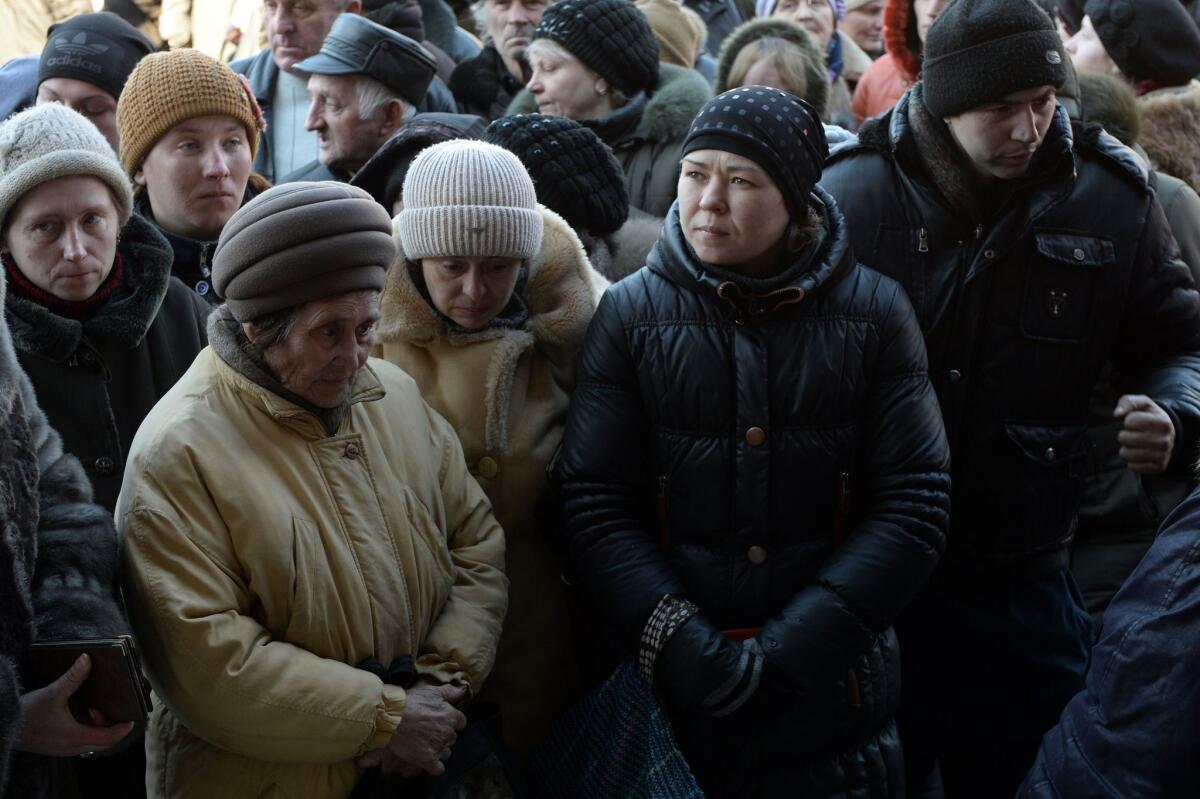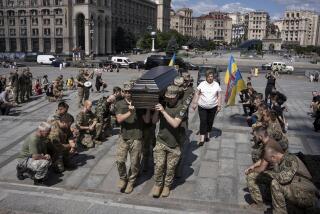Inside Debaltseve: War-weary Ukrainians welcome pause

- Share via
Reporting from Debaltseve, Ukraine — Shell-shocked, exhausted and hungry, the residents of this nearly destroyed city are slowly emerging from their basements and bomb shelters to begin the arduous process of piecing their lives back together after living through months of some of the worst fighting in Ukraine’s 10-month-long conflict.
Sunday morning brought bright rays of sunshine, and those who still had a standing house or apartment took advantage of the warmer weather to sweep up the broken glass and clear out the wreckage left by mortars and Grad missile attacks.
“I don’t care when they turn on the water or electricity, I just want the heat back,” said Irina Pelechenko, 38, who lived in a basement for two months during the worst of the fighting. “I’m just so tired of being cold.”
Pelechenko’s two-room apartment now has blankets and plastic sheets as temporary stand-ins for her shattered windows. The entire town has not had water, gas, electricity or heat in weeks. Pelechenko said the temperature in her apartment has been in the mid-20s Fahrenheit, so she sleeps in her coat and hat.
It’s been five days since Ukrainian soldiers pulled out of this strategic transportation hub, which the Kiev forces and the Russia-backed rebels fought brutally to control for months. The Ukrainians’ retreat was the third in a series of crushing military defeats for Kiev, which had struggled to push back the separatists’ recent advances.
Despite numerous attempts at a cease-fire, the conflict shows no signs of abating. On Sunday, artillery rounds and shelling could be heard from the center of the rebel-stronghold of Donetsk.
Also Sunday, an explosion during a memorial rally in neighboring Kharkiv, Ukraine’s second largest city, killed two. Kiev detained four suspects they said were trained in Russia. Moscow has continuously denied being involved in anything more than moral support for the separatist rebels.
There is little faith here in the latest cease-fire signed on Feb. 15. In Debaltseve, many blame Ukrainian President Petro Poroshenko and sympathize with the rebels, who claim they have “liberated” the city from Kiev.
“He won’t stop now because he knows that if he does, he’ll have to kill himself just like Hitler did,” said Vladimir Novikov, 63, a retired welder. “He knows he’s committed crimes against our people.”
The rebels from the self-declared Donetsk People’s Republic quickly declared victory in Debaltseve after the Ukrainians withdrew. The rebel commanders then set about bringing Debaltseve, which had been tenuously under the Ukrainian flag for most of the 10-month conflict, under rebel influence.
In the city center Sunday, rebel fighters set up loudspeakers to blare pop songs praising the “heroes” of the Donbas, as the industrial eastern regions of Ukraine are known.
“Wake up, Donbas! Wake up, my motherland! Russia, we are united with you!” rang out across the central square, where hundreds of civilians stood in line to receive food aid packets from the International Committee of the Red Cross.
Nadezhda Sidorinka, 75, struggled to get her 15-pound box steady on a rusted sled. Sidorinka said the box contained macaroni, canned meat and sugar, basic supplies few have been able to get since most of the shops in the city had closed or were destroyed in the fighting.
“It was hell here, that’s all I can say about it,” Sidorinka said. “They bombed us all day and all night.”
The destruction of Debaltseve starts about 10 miles south of the center along a main highway running through the village of Mius. Driving in from the south, the first signs of war come as fresh scars on trees hit by shrapnel. That gradually turns into large clumps of trees shredded by mortars and Grad missile attacks by separatist forces intended to destroy a Ukrainian checkpoint nearby.
The checkpoint is the gruesome scene of charred military vehicles and tanks, some hit so hard by incoming shells that their turrets have been ripped off the base. Neighboring fields are pockmarked with deep holes dug by mortars and shells, evidence of constant bombardment.
Rebel fighters have begun picking up the wreckage on the road. The bodies of two Ukrainian soldiers, their faces covered with tattered pieces of clothing, still lie next to their destroyed, sandbagged bunkers. Beside them are dozens of green ammunition boxes and empty mortar shells.
Farther down the road in the residential areas, it’s hard to find a building that doesn’t bare a scar from either shrapnel or a direct hit.
Before the war, the city had about 25,000 people. Thousands fled when the fighting started in late summer on the outskirts of the city. Others moved into basements, and would go out only to get water from a well or to cook over a fire pit. With no running water for weeks, they took sponge baths in curtained areas of the basements. Buckets served as toilets.
The sound of shelling and heavy artillery was relentless.
“You want to know how bad it was? My son is now wetting his bed again for the first time in years. He’s 8,” said Tatiana Samarskaya. “Eight-year-olds aren’t supposed to wet their beds every night.”
Ayres is a special correspondent
More to Read
Sign up for Essential California
The most important California stories and recommendations in your inbox every morning.
You may occasionally receive promotional content from the Los Angeles Times.














